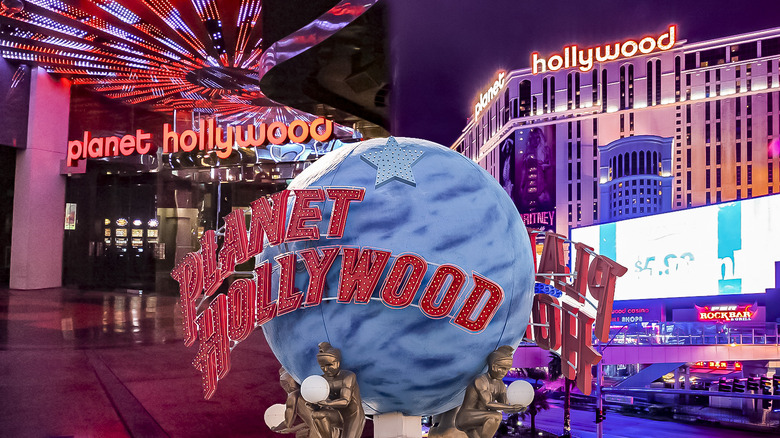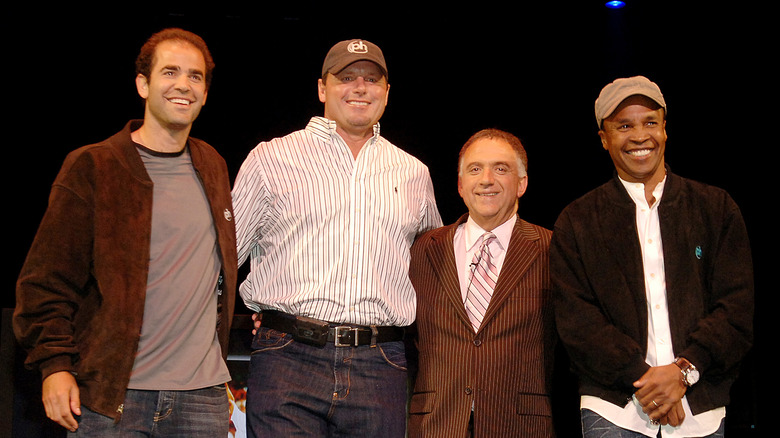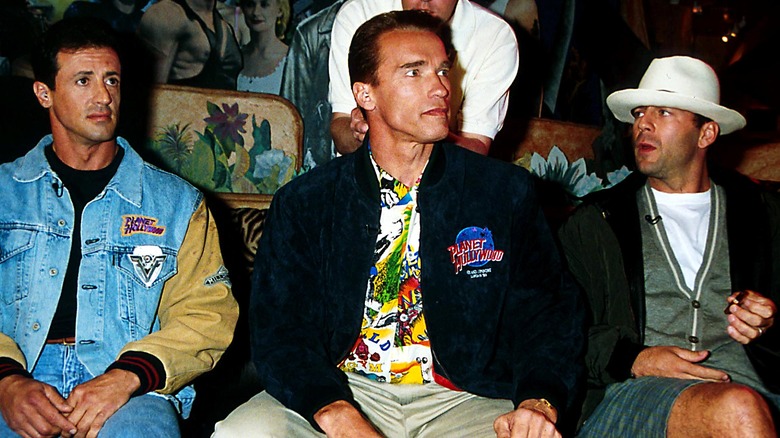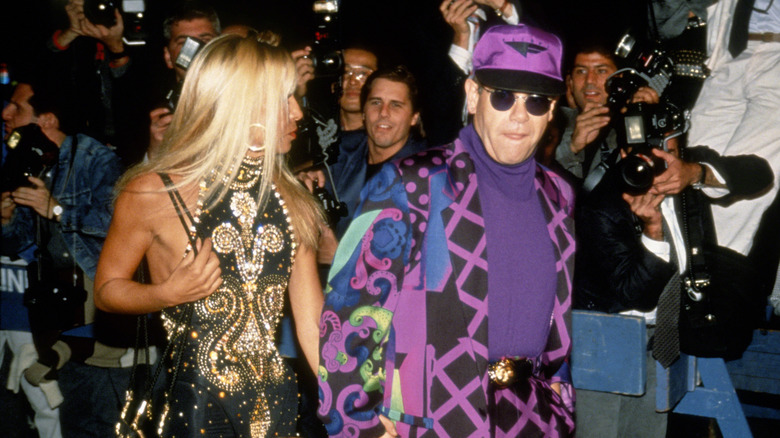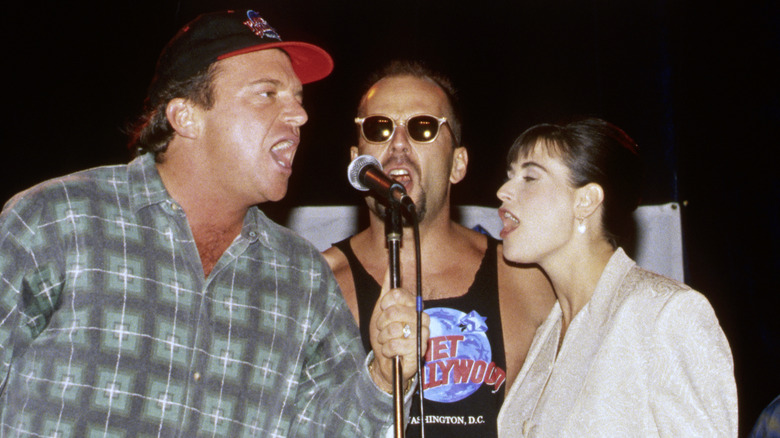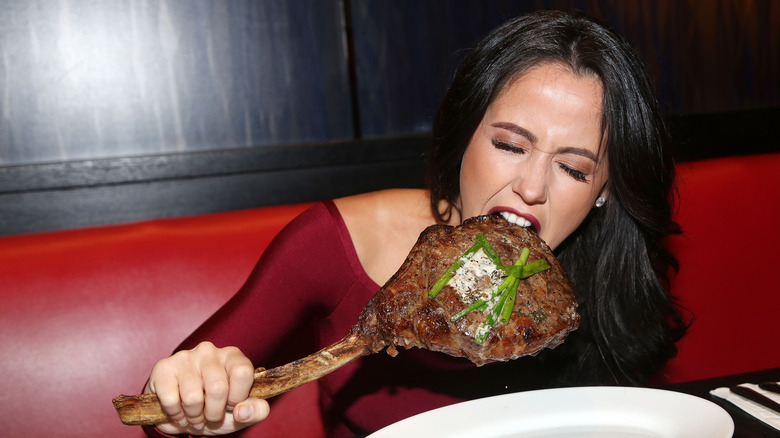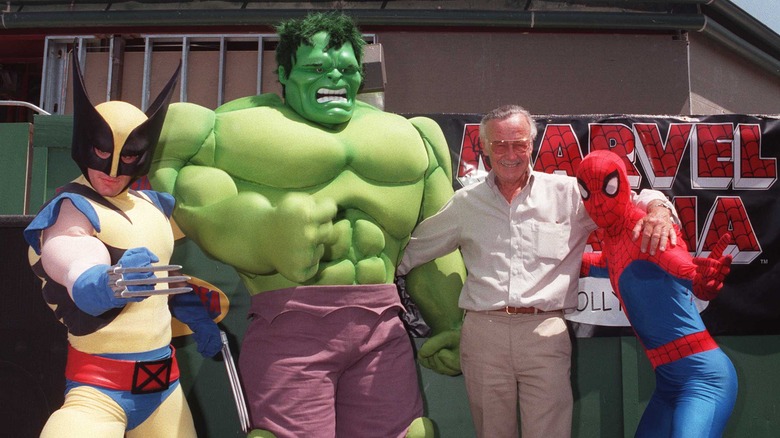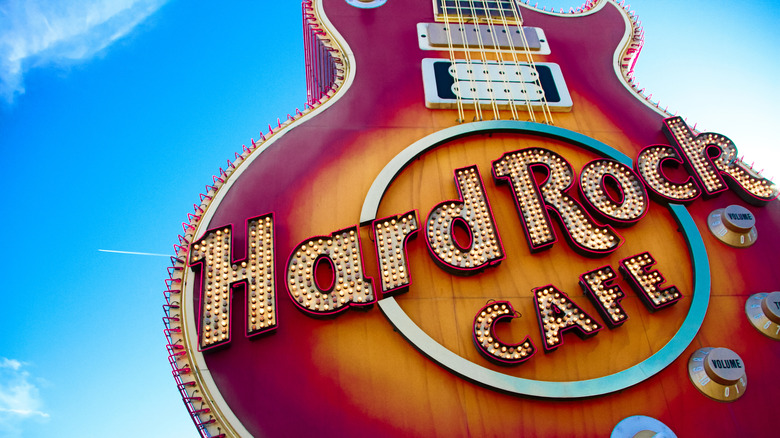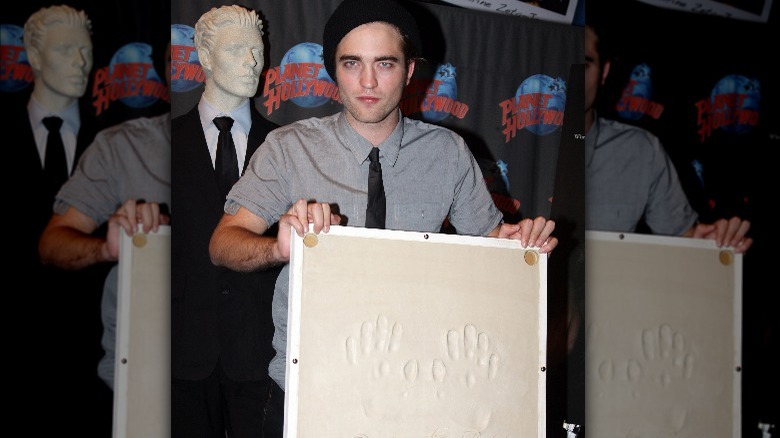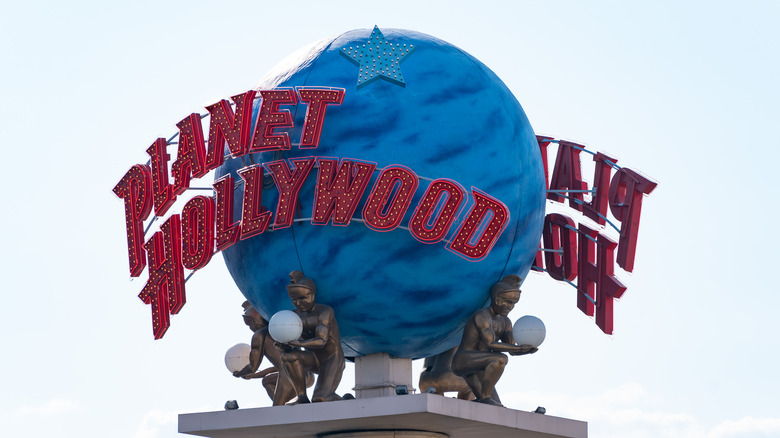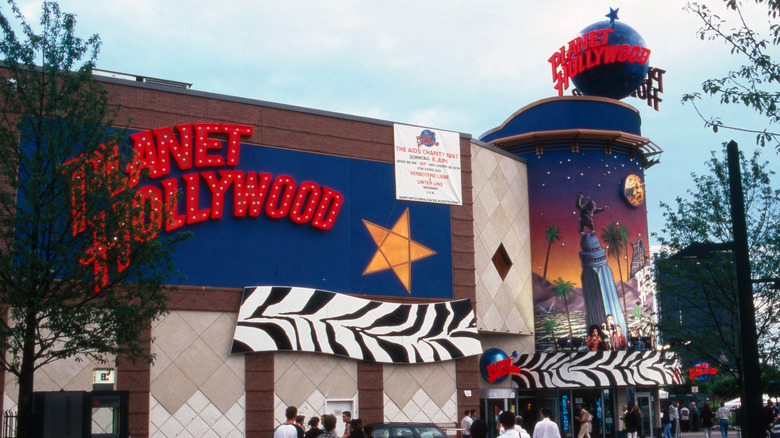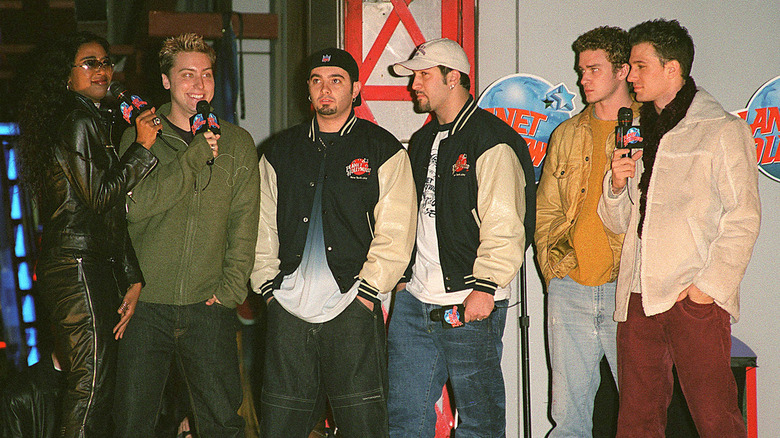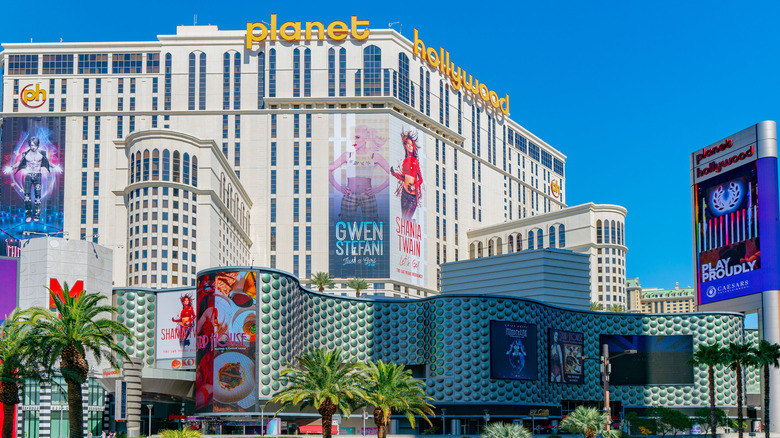What Really Happened To Planet Hollywood And Where You Can Still Find Them
What is it about human nature that makes us prone to celebrity worship? Is our culture-wide fascination with the lifestyles of the rich and the famous simply a desire to live vicariously through those individuals who've achieved their champagne wishes and caviar dreams? Or is there a deeper meaning behind the borderline voyeuristic obsession many 21st-century individuals seem to foster with celebrities? We can't say for sure (we're only trained in pop psychology, after all). But we have a hunch this aspect of humanity helps explain the brief, exponential rise of Planet Hollywood during the 1990s.
If you missed the heyday of Planet Hollywood — the themed restaurant filled with movie props and memorabilia, which was famously backed by countless celebrities, including Bruce Willis and Arnold Schwarzenegger — well ... you may not even realize the chain had a heyday in the first place. Despite a seemingly tried-and-true business formula and a gaggle of associated celebrities (with enough star wattage to turn night into day), Planet Hollywood didn't exactly conquer the restaurant world (or galaxy).
Thankfully, understanding what happened to Planet Hollywood (which at its '90s peak operated at least 60 worldwide locations, and tallied $500 million in sales) isn't like following some byzantine film plot — it's as straightforward as the latest popcorn flick. So if you're curious why the restaurant failed to reach orbit, keep reading, as we explain what really happened to Planet Hollywood and where you can still find them.
Planet Hollywood was founded by a Hard Rock Cafe executive
Like many others, we've often viewed Planet Hollywood as the film and television equivalent of the Hard Rock Cafe. Of course, the natural point of comparison between the two themed restaurant chains isn't a coincidence. Nor were those similarities lost on Hard Rock Cafe co-founder Peter Morton (hold that thought). After all, Planet Hollywood's founder Robert Earl didn't just work for Hard Rock Cafe beforehand — he was the CEO of the music-themed chain before launching his film-centric version in 1991.
Now, while Earl was indeed a high-ranking executive with Hard Rock before Planet Hollywood's existence, it wasn't his first time working with themed restaurants. Earl's experience with that type of dining establishment extended as far back as 1972, when the British-born businessman started The Beefeater (a dinner theater that eventually was part of a $63 million merger)
The chain's founder remains CEO of Planet Hollywood International as of May 2023. Seeing how Earl is still actively involved with the company, it seems he's as committed as ever to his movie-themed restaurant.
Early investors included some of the world's biggest movie stars
The entire purpose of an establishment like Planet Hollywood is to provide guests with a movie-themed experience unlike any other. In order to project an image of genuine star power and blockbuster appeal, Planet Hollywood employed a number of the world's most famous movie stars to promote the chain. But it wasn't just a matter of celebrities being paid to endorse the restaurant. Many famous folks were offered the chance to invest in Planet Hollywood as well, prompting their ongoing participation throughout the '90s.
Anyone who was around during Planet Hollywood's boom period is likely aware of the chain's three main celebrity benefactors: Arnold Schwarzenegger, Bruce Willis, and Sylvester Stallone. Of course, it's not as if those actors attempted to conceal the partnership. Their often shameless promotion of Planet Hollywood included being present at numerous grand opening events for new locations — usually while rocking a neverending rotation of swag adorned with the restaurant's trademark logo.
The members of that famed trio weren't the only ones to stake a financial claim in Planet Hollywood upon its debut. Because the chain offered its version of an employee stock ownership plan at one point, additional famous investors included Willis' then-wife Demi Moore, as well as Oscar-winning actor and comedian Whoopi Goldberg.
Its 1991 New York City grand opening was a star-studded affair
Movie premieres and red carpet events have become synonymous with celebrities since almost the beginning of the film industry. This also means that when your entire business model is based on famous films and movies (and is backed by some of the biggest movie stars in the world), you can't go small when you launch. So when Planet Hollywood's first location opened in New York City in November 1991, it didn't disappoint, offering a star-studded (and fan-frenzied) grand opening that seemed to portend a great future (until it didn't, that is).
After several months of hype, Planet Hollywood spared no expense when it came to its official debut, spending $750,000 on the event. Featuring a veritable who's who of world-famous actors and film industry legends from the early 1990s (including Michael J. Fox, Alec Baldwin, and Garry Marshall, among many others), the red carpet naturally drew a plethora of paparazzi and adoring fans.
It wasn't just a few overly-excited folks who showed up, either. Instead, 10,000 eager fans (most of whom were almost certainly unable to get inside the actual restaurant) came out for the evening. In other words, the world was ready for Planet Hollywood, and the restaurant made sure to match that excitement at the start.
The restaurant chain expanded aggressively (and foolishly) throughout the 1990s
When you think of a themed restaurant like Planet Hollywood, certain cities and locations are a natural fit. For instance, if there's an already fairly high number of tourists moving through an area, then opening such an establishment there makes perfect sense. Whether or not Planet Hollywood was concerned with this when it came to opening new locations after the smashing success of its 1991 debut, we can't say for sure. But the company was clearly eager to expand either way and opened several new restaurants around the world throughout the 1990s.
Now, if the restaurant had been able to maintain its early momentum, then there's a chance Planet Hollywood could have thrived long beyond the early 1990s. As it was, the company's desire to grow seemed to take precedence over all else (a mindset potentially driven by the belief that its initial popularity would never diminish).
At one point, Planet Hollywood could boast 60 restaurants in operation around the world. But with dozens of now-shuttered Planet Hollywood locations as of May 2023, it's obvious the Robert Earl-founded business wasn't destined to take over the actual planet.
Planet Hollywood's lackluster food led to a dearth of returning customers
Realistically, one of the only ways a restaurant can grow and prosper is by cultivating repeat customers. Frankly, without the presence of diners who are eager to enjoy an establishment's fare and environment on more than one occasion, there's simply no feasible path to long-term viability. Planet Hollywood discovered this the hard way during its gradual downturn throughout the 1990s — mainly because it served some of the least satisfying food seen at a big-time restaurant that we can remember.
Perhaps the company believed its status as a movie museum-adjacent establishment meant it could short-change the number one reason people tend to choose a restaurant. Regardless of the rationale for its uninspiring menu, it's virtually impossible to pin Planet Hollywood's lack of large-scale, long-term success on anything other than its utterly lackluster food.
We suppose there's a chance the overall quality of Planet Hollywood's food has been upgraded since the turn of the millennium. Then again, with such a subpar reputation, it's tough to imagine Planet Hollywood's food being any worse than it was once upon a time.
Efforts to diversify the Planet Hollywood brand led to huge financial losses
Themed restaurants will always have a place in modern society. Of course, just because that type of dining establishment will forever be popular in some capacity doesn't mean the general public is ravenous for all themed restaurants to exist. Planet Hollywood became acutely aware of these limitations as the 1990s wore on, particularly once it tried to expand beyond film into ventures like music, gambling, and hotels. Eventually, however, it had nothing but financial losses to show for it.
Do you remember Marvel Mania, the Universal Studios-set restaurant in Orlando that opened in 1998? Of course, you don't (just as you wouldn't recall the planned Times Square location that never opened). What about the Official All-Star Cafe, which was set to do for professional athletes what Planet Hollywood did for movie stars? It counted greats like Tiger Woods and Wayne Gretzky among its celebrity endorsements. You might remember that but as little more than a decades-old anomaly.
If there's a lesson to be taken from Planet Hollywood's unsuccessful attempts to conquer the world, it's that there's power in understanding your limitations. Planet Hollywood remains a small yet functioning company as of 2023. And if it stays true to its movie-lover roots, it just might remain that way for quite some time.
Hard Rock Cafe accused Planet Hollywood of being a cheap knockoff
No creative endeavor may be wholly original in the 21st century, but there's a marked difference between finding a new angle on a pre-existing concept, and blatantly copying that idea wholesale. It's tough to say where, precisely, Planet Hollywood falls on that spectrum. Yet the fact Planet Hollywood was founded by Robert Earl while he was the CEO of Hard Rock Cafe makes it rather difficult to simply dismiss the 1992 lawsuit filed by Hard Rock Cafe against the competing chain.
Though Earl contended his restaurant and concept was "just a normal piece of competition," as he told Entertainment Weekly in 1993, the owners of Hard Rock Cafe were unconvinced. The music-themed restaurant chain (and its co-founder Peter Morton) even went so far as to describe its newfound competitor as "similar but of substantially lower quality" (via Tampa Bay Times) in its lawsuit against Planet Hollywood.
Eventually, Hard Rock got the upper hand and was award a pricey settlement believed to be in the millions, though the results are sealed and we don't know the exact amount. Regardless of how the courtroom drama played out, when you consider that Hard Rock Cafe has dozens of open locations as of May 2023, while Planet Hollywood has fewer than 10 worldwide locations? Well, it seems apparent which company won in the long run.
The movie memorabilia far outshined the menu for many diners
There's more to a restaurant (and to the entire concept of dining) than the food being served. While the importance of ambiance and service is hard to quantify, there's little incentive to return to a restaurant if the food itself is barely worth the plate it's served on. In that sense, while the movie-themed merchandise on display at Planet Hollywood should (and does) play an essential role in appealing to the masses, the fact the movie memorabilia greatly outranked the food in most guests' estimation meant the chain's costly 1990s expansion may have been doomed from the start.
The fact that Planet Hollywood's absurdly underwhelming menu ranked well below the on-hand props and memorabilia doesn't appear confined to its '90s rise and fall. As recently as 2020, some guests of the location at Walt Disney World found its famous movie items — like the wooden door Rose floats on at the end of "Titanic" — far more enticing than the grub.
Will Planet Hollywood ever decide to revamp its menu and focus on providing only top-notch, unbeatable culinary concoctions? We doubt it. But since no one's really going to the restaurant for the food, it has little incentive to do so.
A terrorist attack at a South African Planet Hollywood didn't help matters
In many ways, all that matters in life is perception. You may be encouraged not to judge a book by its cover — or a person or business based on an external, potentially uninformed viewpoint — but that doesn't mean we always withhold judgment. It may be unfair to claim a 1998 terrorist attack at the Cape Town, South Africa Planet Hollywood contributed to the restaurant's downward spiral — but it certainly didn't make the company's situation any better.
Tragically, two people were killed in the attack and more than 20 were injured after a pipe bomb was detonated in the bar of the Cape Town location in August 1998. The act (purportedly committed by a terrorist organization in revenge for U.S. military intervention in Sudan and Afghanistan) rattled a community that had already dealt with civil unrest during South Africa's apartheid (which had officially ended just a few years earlier).
Now, it's extremely unlikely this tragedy was the root cause of Planet Hollywood's downturn at the end of the 1990s. Moreover, the impact on an international corporation isn't nearly as important to remember as the devastating damage suffered by people. It also pales in comparison to the life lost.
Celebrities backed away as Planet Hollywood's shine dulled
Before we dive into this slide too deeply, it's important to remember that celebrities will always be associated with Planet Hollywood as long as the restaurant remains open. Yet the seeming free-for-all of celebrity endorsements in the early-to-mid 1990s dwindled as the decade wore on — causing many celebrities to turn away from the chain.
It can't be entirely shocking to discover Planet Hollywood's cache with well-known actors diminished in concert with its fading corporate prowess. But knowing that Arnold Schwarzenegger himself cut ties with Planet Hollywood in 2000 — stating he was "disappointed that the company did not continue with the success (he) had expected and hoped for" (via The Telegraph) — demonstrates how far the company fell by the turn of the century.
Of course, just as there will never be a shortage of celebrities willing to endorse a product if the price is right (regardless of its quality), there is no Planet Hollywood without famous actors and actresses behind it. So while the restaurant is unlikely to ever again match its bonanza of famous investors from the '90s, well ... it's still Planet Hollywood.
A second bankruptcy filing signaled Planet Hollywood's downfall
As many of us are aware, a company filing for bankruptcy doesn't necessarily mean that the business is definitively doomed. More often than not, claiming bankruptcy is merely an attempt to restructure a company's finances, allowing it to move forward sans crippling financial debts. Of course, if a company files for bankruptcy twice and does so within a three-year span, as happened with Planet Hollywood in 2001, then the odds of it returning to its former glory become fairly improbable.
Now, when you consider the fact that some Planet Hollywood locations continue to operate as of May 2023, it's rather obvious the chain's second bankruptcy (which followed a 1999 Chapter 11 filing, when the company found itself $156 million in debt) didn't lead to its closure. But it did signal the end of the themed restaurant's dreams of worldwide domination, as it revamped and reduced its previous expectations.
A handful of Planet Hollywood locations remain open
Did you know the so-very-1990s restaurant chain known as Planet Hollywood is still in business as of May 2023? Of course, you did — at least, you know this by now. After all, not only is the article's title a dead giveaway, but we've acknowledged Planet Hollywood continues to operate several times, as well. Yet it isn't just the brand's standalone restaurants (like the ones you remember from the last century) that remain in business in the post-COVID-19 world. There are also a few Planet Hollywood resorts and hotels that are still in operation.
A handful of standard Planet Hollywood restaurants continue to operate as of May 2023, including one in Malta and another at Los Angeles International Airport (a restaurant appears scheduled to reopen in New York City, though it's unclear when). Additionally, the company maintains a small group of luxury hotels and resorts, including locations in Cancun, Mexico, and Uttorda Beach in Goa, India.
In other words, if you're still craving the Planet Hollywood experience, you don't have to cling to memories. If you're so inclined, you can simply head to the nearest location and ogle well-worn movie props while noshing on chicken tenders.
